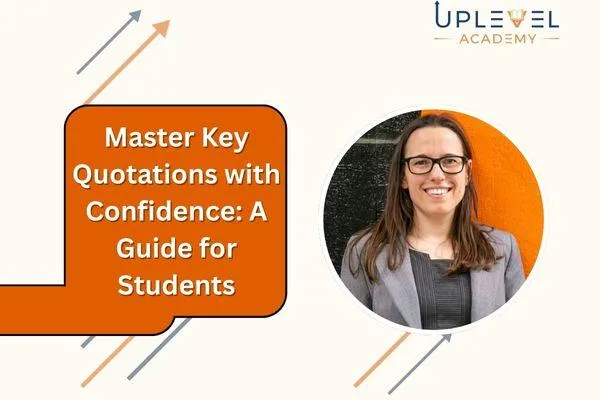
Master Key Quotations with Confidence: A Guide for Students
By now, the new term is well underway, and students are settling into routines. One of the trickiest parts of GCSE English is using quotations effectively. Do you know how to analyse a quote, make an inference, and link it to the bigger picture? Doing this confidently can dramatically improve your essays and exam answers.
In this post, we’ll break it down step by step, giving you practical tips to make quotations work for you.
Step 1: Understand the Literal Meaning 📖
Start with the basics. Ask yourself:
What is literally happening in this line?
Who is speaking, and what is happening?
For example, from Macbeth:
“Is this a dagger which I see before me…”
Literal: Macbeth sees a dagger floating in front of him.
Understanding the literal meaning gives you a solid foundation before diving deeper.
Step 2: Make an Inference 💡
Next, think about what the quote implies beneath the surface:
What is the character feeling?
What are their motives?
Are there hidden meanings or ideas?
Example:
“Is this a dagger which I see before me…”
Inference: Macbeth is tempted and anxious. The hallucination shows his guilt and moral conflict.
Step 3: Identify Symbolism ✨
Look for symbols, key words, or repeated images. How do they connect to larger themes?
Example:
The “dagger” could represent ambition and the deadly path Macbeth is about to take, linking to the theme of moral corruption.
Step 4: Offer an Interpretation 🧠
Consider different perspectives:
How might other readers understand this quote?
What does it reveal about the character, society, or theme?
Example:
Some might see Macbeth’s vision as supernatural, showing the influence of fate; others may interpret it as a manifestation of his inner guilt and moral conflict.
Putting It All Together 🏗️
When writing an essay, use the Literal → Inference → Symbolism → Interpretation structure:
Introduce the quote in context
Analyse it step by step
Link it back to the question and theme
Even practising this for a few quotations a week will build confidence and make your answers more analytical and structured.
Tip: Practice Regularly ⏰
Pick one quotation from each text you’re studying each week
Analyse it using these four steps
Write a mini paragraph applying it to a potential exam question
This small, consistent practice will make a big difference over time.
Next Step
Want to go deeper? Our Macbeth Guide includes:
90+ pages of in-depth quotations and analysis
How to use quotations
What examiners are looking for
Language, Structure, and Literary devices
Social Historical context
A breakdown of the plot, and dramatic turns
Model answers for all grade boundaries
A video walkthrough showing you how to use the guide effectively
The full guide is over 250 pages long (yes, seriously). It’s a complete guide including everything you need to master Macbeth, and it's only £14.97!
